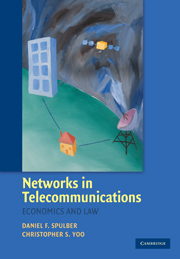Conclusion
Published online by Cambridge University Press: 05 June 2012
Summary
From the very beginnings of the telephone and telegraph industries, the evolution of the communications sector has fundamentally transformed social and economic relations. Virtually all collaborative work within and between organizations depends on electronic interaction. Personal communications have moved beyond simple voice communications to encompass e-mail, instant messaging, text messaging, and online virtual communities. Electronic commerce is no longer a separate category, because practically all business transactions use electronic communications, including retail, wholesale, inventories, procurement, and manufacturing. Mobile communications using computers, phones, planners, and other devices have made every individual a node in the network. The communications system is now central to every form of economic activity, including purchases, payments, music, images, video, music, entertainment, marketing, and search.
Although much public policy continues to reflect the traditional approach to telecommunications, the evolution of communications has caused some changes in the regulatory framework. The primary focus of regulatory policy in telecommunications has shifted from traditional rate regulation, which regulates the terms under which final goods are provided to end customers, to mandated access, which regulates the terms under which network services are provided to competitors. This regulatory change, as exemplified by the Telecommunications Act of 1996 and the actions of the Federal Communications Commission, has affected the entire communications sector, including local telephone networks, long-distance telecommunications, broadband networks, and the Internet. The shift has major implications for economic usage of the communications sector, including information technology generally and electronic commerce.
- Type
- Chapter
- Information
- Networks in TelecommunicationsEconomics and Law, pp. 433 - 438Publisher: Cambridge University PressPrint publication year: 2009



